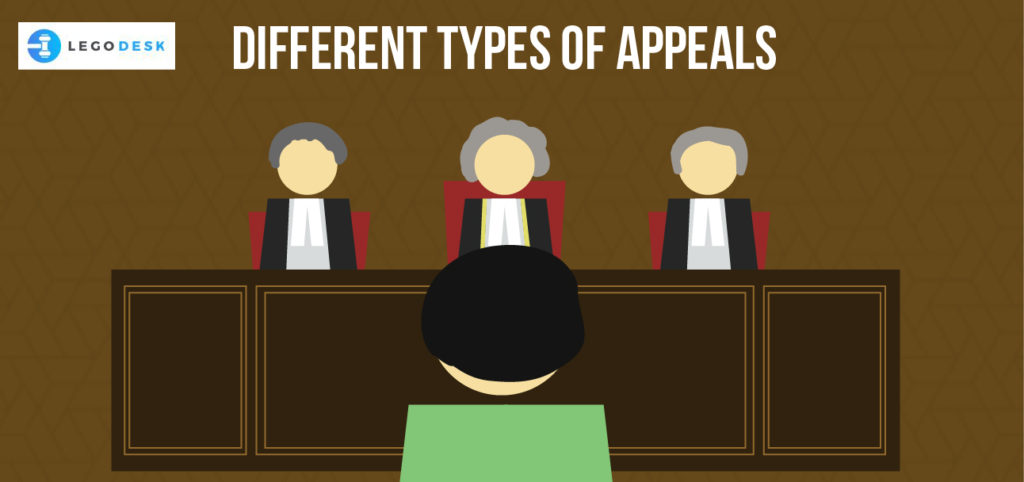Different Types of Appeals in India

An appeal can be regarded as the procedure wherein a review of already decided cases takes place on the request of either party. It is an application or petition which is filed by the aggrieved party who is not satisfied with the decision of the current forum and seeks reconsideration of the decision in a forum higher than the forum which gave the decision. They also function as a procedure for rectifying errors as well as a procedure that helps in better clarification and interpretation of the law.
What can be appealed?
An appeal can be filed to question the
- Evidence submitted by the parties in lieu of proving guilt
- The judgment passed by the court
- The proceedings of the case
- Abuse of discretion of the court
- The application of the law in the case.
Supreme Court is the highest court of appeal. The right to appeal is neither a natural right nor inherent right, it is a right guaranteed by the Indian Constitution, 1950 and various other statutes, therefore a statutory and substantive right. And the total number of appeals a person has depends on the number of courts superior to the court giving the judgment. An appeal lies differently in different matters such as criminal matters, constitutional matters, and civil matters.
In Constitutional Matters
In order to fall under the purview of a constitutional matter, a case must involve a substantial question of law regarding the interpretation of the Constitution as per Article 132(1), and hence the said judgment, decree or final order pronounced by the High Court irrespective of it being of civil nature or criminal nature can be appealed before the Supreme Court. By obtaining a certificate under Article 132(1), Article 133(1) or 134 an appeal can lie in the Supreme Court.
Article 132(3) provides a right to appeal to any party in the case before the Supreme court for any question so wrongly decided.
In Civil Matters
Section 96 of the Code of Civil Procedure gives a comprehensive provision for appeal in case of original decrees. No appeal can lie from appeal decrees which are passed by the court with the consent of both the parties. The appeal however maybe preferred who is not a party to the appeal and will be prejudicially affected by the decree.[1]
Section 100 gives the right to appeal from an appellate decree. Section 109 gives the right of appeal to the supreme court in certain cases.
Orders are distinguished from decrees. And not all orders are appealable. In a landmark case of Supreme Court (Amarjeet Kaur vs. Pritam Singh[2]), it was held that in cases where an appeal against a decree stands pending and the court with appellate jurisdiction has gone through the whole matter and is subject to sub judice the said decree is said to be final. And both the decrees are then merged and the appellate court rests with the same powers that are conferred upon the court of original jurisdiction.
Under Article 133 a civil matter can be appealed in the Supreme Court if there is been a substantial question of law or anything is wrongly decided and needs to be decided correctly. The high court first grants a certificate to appeal to Supreme Court, within 60 days of receipt of such certificate an appeal can be made to the Supreme Court.
In the case of Criminal Matters
Article 134 of the Indian Constitution provides that an appeal to the Supreme Court, without the certificate of a High Court, shall stand maintainable in the said circumstances:
- When an order of acquittal was passed but now has been reversed and provides the accused person with a death sentence or imprisonment for life or imprisonment for a term of 10 years or more. Or
- When the high court withdraws any matter so decided before the trial court, to try before it that sentences an accused person death.
It was also held by the Supreme Court that for a grant of a certificate of fitness there shall exist special circumstances succeeding the judicial application of mind by a High Court.[3]
In the case of Special Leave Petition
The appellate jurisdiction of the supreme court very wide extending to Article 136 as well which provides with the grant of Special Leave Petition. SLP lies against any judgment or decree so passed or made by any court in India.
The limitation period for such appeal is 90 days from the date of judgment or decree.
Appellate Jurisdiction of the high court
The High Court has jurisdiction to try appeals for both civil and criminal cases. The High Courts can try matters where the judgment was given by District Judges and Courts of Munsifs. In criminal cases, high courts can hear appeals from the above courts and the Sessions and Additional Sessions, Judge.
An appeal from the decision of session judge lies when the sentence is for the imprisonment of seven years or more. High Courts can hear appeals from the orders of the tribunal.[4]
Appeal from the decision of Supreme Court
Supreme Court is the highest court of appeal and no appeal can lie for the correction of the judgment of the Supreme Court. However, there is an option of a review petition which is filed in the Supreme Court asking the Supreme Court to review its own judgment. The petition for review needs to be filed within 30 days from the date of judgment.
[1] State of Punjab v. Amar Singh, AIR 1974 SC 994
[2] 1974 AIR 2068
[3] Mohinder Singh v. the State of Punjab
[4] 43rd Constitutional Amendment, 1977
Try our Debt Resolution solutions today Request a Demo